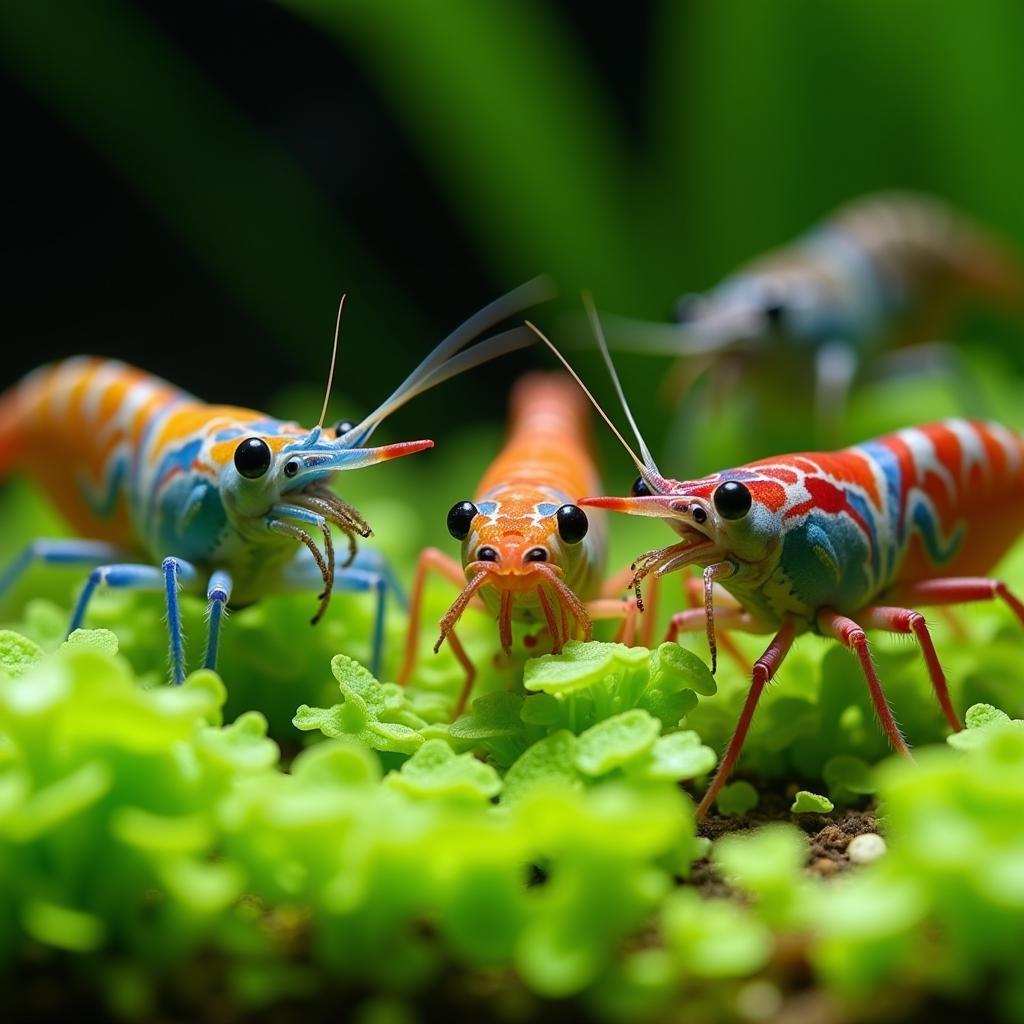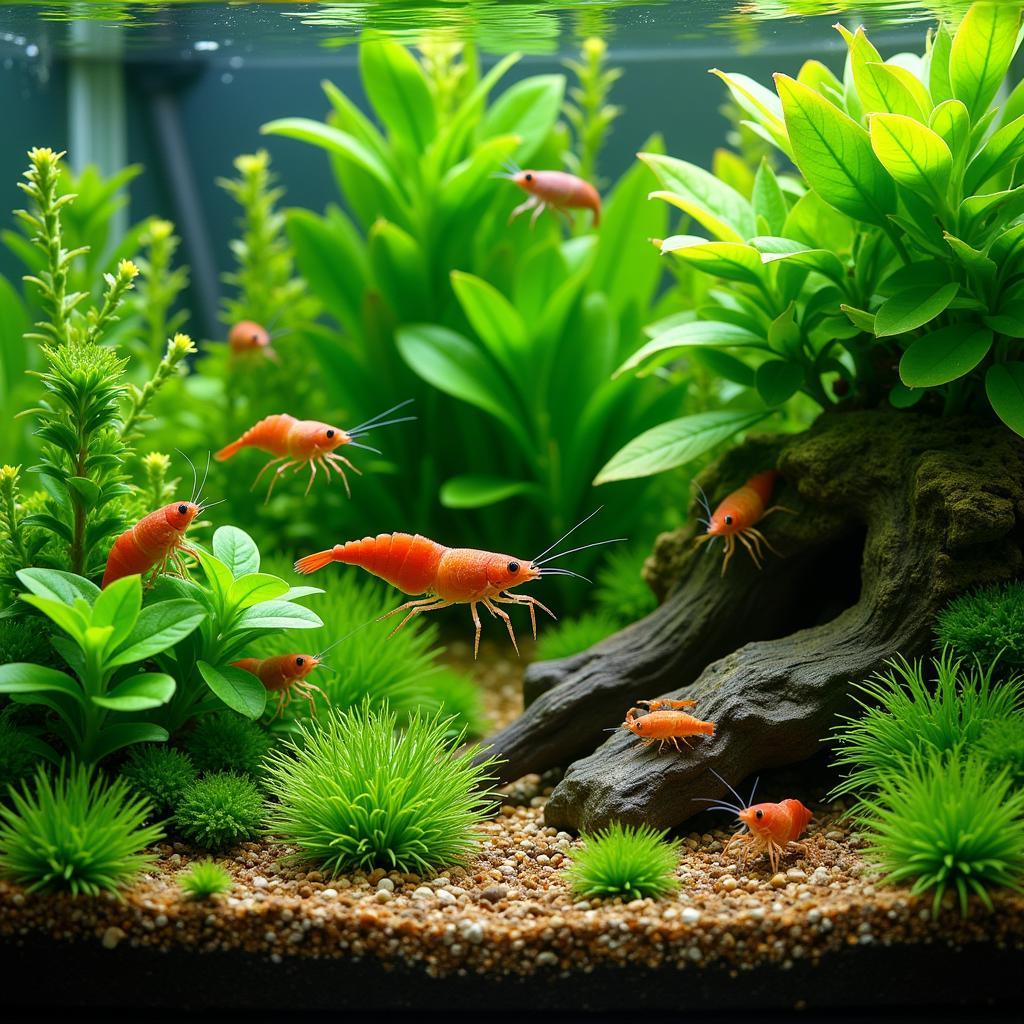Aquatic Shrimp Food is a crucial aspect of keeping healthy and vibrant shrimp. Choosing the right food can significantly impact their growth, color, and overall well-being. This comprehensive guide will delve into everything you need to know about selecting and using the best aquatic shrimp food for your tank.
Understanding the Nutritional Needs of Your Shrimp
Shrimp, while small, have complex dietary requirements. A balanced diet consisting of proteins, carbohydrates, fats, vitamins, and minerals is essential for their optimal health.  Shrimp feeding on algae wafers Protein is vital for growth and tissue repair, while carbohydrates provide energy. Fats contribute to healthy cell function, and vitamins and minerals support various physiological processes. Failing to provide a balanced diet can lead to stunted growth, weakened immune systems, and a decrease in vibrant coloration.
Shrimp feeding on algae wafers Protein is vital for growth and tissue repair, while carbohydrates provide energy. Fats contribute to healthy cell function, and vitamins and minerals support various physiological processes. Failing to provide a balanced diet can lead to stunted growth, weakened immune systems, and a decrease in vibrant coloration.
Types of Aquatic Shrimp Food
There’s a wide array of aquatic shrimp food available, each catering to different needs and preferences. These include:
- Prepared Shrimp Foods: These are commercially available and come in various forms, such as pellets, flakes, wafers, and sticks. They are often formulated to provide a balanced diet and are convenient for daily feeding. shrimp king shrimp food is a popular choice for many shrimp enthusiasts.
- Freeze-Dried Foods: These offer a convenient way to provide nutritious options like bloodworms, daphnia, and brine shrimp. They retain much of their nutritional value and are a good source of protein. Consider options like frozen brine shrimp fish food for a high-protein treat.
- Live Foods: Live foods, such as baby brine shrimp and microworms, are a natural and highly nutritious option, especially for young shrimp. They stimulate natural foraging behavior and provide a rich source of essential nutrients.
- Vegetables and Fruits: Blanched spinach, zucchini, and small pieces of fruit like banana or apple can supplement a shrimp’s diet and provide valuable vitamins and fiber. Ensure these are washed thoroughly and removed after a few hours to prevent water contamination.
Choosing the Right Aquatic Shrimp Food
Selecting the right food depends on various factors, including the species of shrimp you keep, their age, and the overall setup of your tank. For instance, smaller shrimp might prefer finer foods like flakes or powders, while larger shrimp can handle larger pellets or wafers. shrimp king food offers a range of options to suit different shrimp sizes and species.
What is the best food for baby shrimp?
Baby shrimp benefit greatly from live foods like microworms and baby brine shrimp, which are rich in protein and easy for them to consume.
How often should I feed my shrimp?
Feeding small amounts once or twice a day is generally sufficient. Overfeeding can lead to water quality issues, so it’s best to observe your shrimp and adjust the feeding schedule accordingly.
Aquatic Shrimp Food and Water Quality
The type and amount of aquatic shrimp food you use can directly impact your tank’s water quality. Uneaten food can decompose, leading to ammonia spikes and other harmful byproducts. shrimp fish food is designed to minimize water pollution, but it’s still essential to avoid overfeeding.
“Overfeeding is a common mistake that can quickly deteriorate water quality,” says Dr. Emily Carter, an aquatic biologist specializing in invertebrate health. “It’s crucial to feed your shrimp only what they can consume within a few hours.”
Creating a Balanced Diet for Your Shrimp
A varied diet is key to ensuring your shrimp receive all the necessary nutrients. Combining prepared foods with occasional supplements of live or freeze-dried foods, and even small amounts of blanched vegetables, can provide a well-rounded and nutritious diet. fish food tropical fish can also be incorporated as a supplementary food source in community tanks.  Vibrant shrimp in a healthy tank
Vibrant shrimp in a healthy tank
“Variety is the spice of life, even for shrimp,” adds Dr. Carter. “Offering a diverse range of food sources not only provides a balanced nutritional profile but also encourages natural foraging behavior.”
Conclusion
Choosing the right aquatic shrimp food is essential for maintaining the health and vibrancy of your shrimp. By understanding their nutritional needs and selecting appropriate food types, you can ensure they thrive in your aquarium. Remember to avoid overfeeding and maintain a balanced diet to promote optimal growth, coloration, and overall well-being.
FAQs
- What are the signs of overfeeding?
- Can I feed my shrimp too much protein?
- What are the best vegetables for shrimp?
- How do I store different types of shrimp food?
- What are the benefits of live food for shrimp?
- Can I make my own shrimp food?
- How do I transition my shrimp to a new food?
Please contact us at Phone Number: 02437655121, Email: minacones@gmail.com, or visit us at 3PGH+8R9, ĐT70A, thôn Trung, Bắc Từ Liêm, Hà Nội, Việt Nam. We have a 24/7 customer service team.